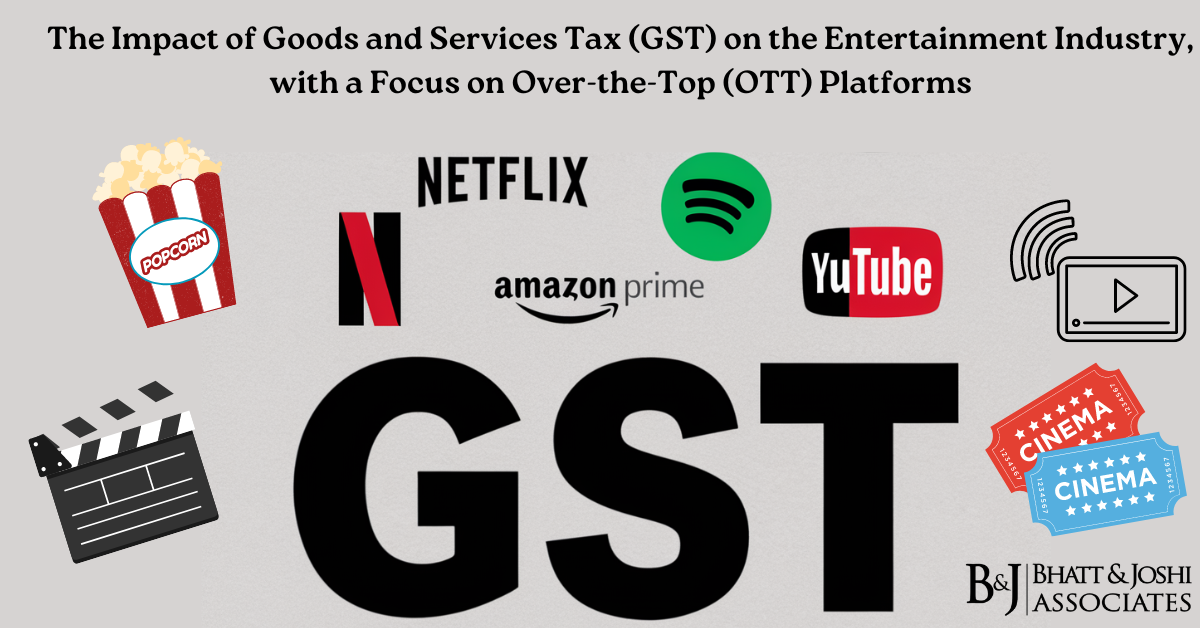Impact of GST on the Entertainment Industry, with a Focus on Over-the-Top (OTT) Platforms
Introduction
The Entertainment industry has experienced a profound transformation in recent years, driven by technological advancements and changing consumer preferences. One of the most significant developments in this space is the rise of Over-the-Top (OTT) platforms, which deliver streamed content directly to consumers over the internet. This article explores the impact of the Goods and Services Tax (GST) on the Entertainment industry, with a specific focus on OTT platforms.
Evolution of Entertainment Industry
The Entertainment industry has evolved significantly over the years, moving away from traditional modes of content consumption, such as broadcast television and cable, towards digital platforms. This shift has been fueled by the widespread adoption of smart devices, including smartphones, tablets, and smart TVs, which provide consumers with greater flexibility and convenience in accessing content. OTT platforms have emerged as key players in this digital landscape, offering a wide range of content, including movies, TV shows, music, and more, accessible on-demand across multiple devices.
Understanding OTT Platforms and Their Significance
OTT platforms, or “over-the-top” platforms, refer to services that deliver video and audio content directly to consumers over the internet, bypassing traditional distribution channels like cable or satellite TV. These platforms have become increasingly popular due to their convenience, flexibility, and vast content libraries. OTT services operate on a variety of business models, including subscription-based, ad-supported, and transactional (pay-per-view) models.
Applicability of GST on OTT Services
Under the GST regime in India, taxation of OTT platforms services is determined by the location of the service provider and the recipient. If both are in India, OTT platforms taxation under GST applies at a rate of 18%. However, if the service provider is outside India and the recipient is in India, the recipient must pay tax under the Reverse Charge Mechanism, with the same GST rate of 18% applying.
Impact of GST on Various Activities in the Entertainment Industry
- Sale of Movie Tickets: The sale of movie tickets through cinema halls or theaters is subject to GST, with different rates applicable based on the ticket price. Movie tickets GST rates vary depending on the ticket price. Tickets priced at Rs. 100 or less are taxed at 18%, while tickets priced above Rs. 100 attract a higher GST rate of 28%.
- Broadcasting through Television: Direct-to-Home (D2H) and cable TV services are subject to GST at a rate of 18%, reflecting the taxation of traditional broadcasting services in the digital era.
- Advertisement Revenue: Advertisement plays a crucial role in the revenue model of OTT platforms, with advertisers leveraging the platform’s wide reach and targeting capabilities. Revenue generated from advertisements is considered business income and
- OTT Platform Income: Income generated from content creation and sharing services on OTT platforms is also subject to GST at a rate of 18%, reflecting the taxation of digital services in the digital economy.
- Sponsored Videos and Affiliate Marketing: Revenue earned from sponsored videos and affiliate marketing activities on OTT platforms is considered business income and is subject to GST at a rate of 18%, aligning with the taxation of similar activities in other sectors.
Conclusion: Navigating GST’s Impact on the Entertainment Industry
The Entertainment industry is undergoing a rapid transformation, driven by technological advancements and changing consumer preferences. OTT platforms have emerged as key players in this evolving landscape, offering consumers greater choice and flexibility in how they access and consume content. However, the introduction of GST has brought new complexities and challenges for businesses operating in this space, particularly regarding taxation and compliance. In conclusion, the impact of GST on the Entertainment industry, particularly for OTT platforms, has introduced new challenges but has also created opportunities for growth and innovation. By understanding and complying with GST regulations, businesses can navigate the evolving regulatory landscape and continue to thrive in the digital era.
Future Outlook
Looking ahead, the Entertainment industry is likely to continue evolving rapidly, driven by technological advancements, changing consumer preferences, and regulatory developments. OTT platforms are expected to play an increasingly important role in the delivery of content, with new players entering the market and existing players expanding their offerings. As the industry continues to evolve, businesses will need to adapt to new trends and regulatory changes to remain competitive and successful in the digital era.
 Whatsapp
Whatsapp


